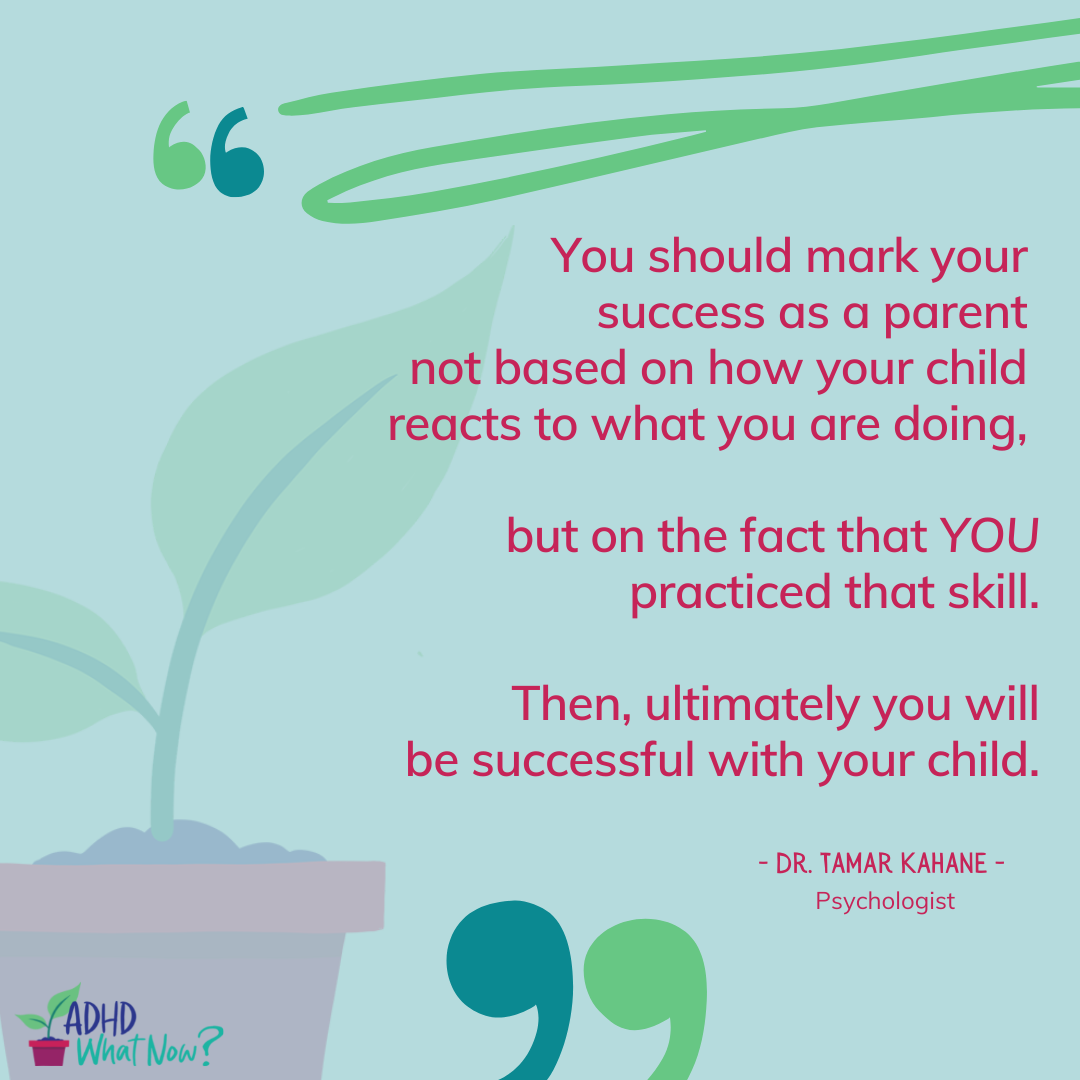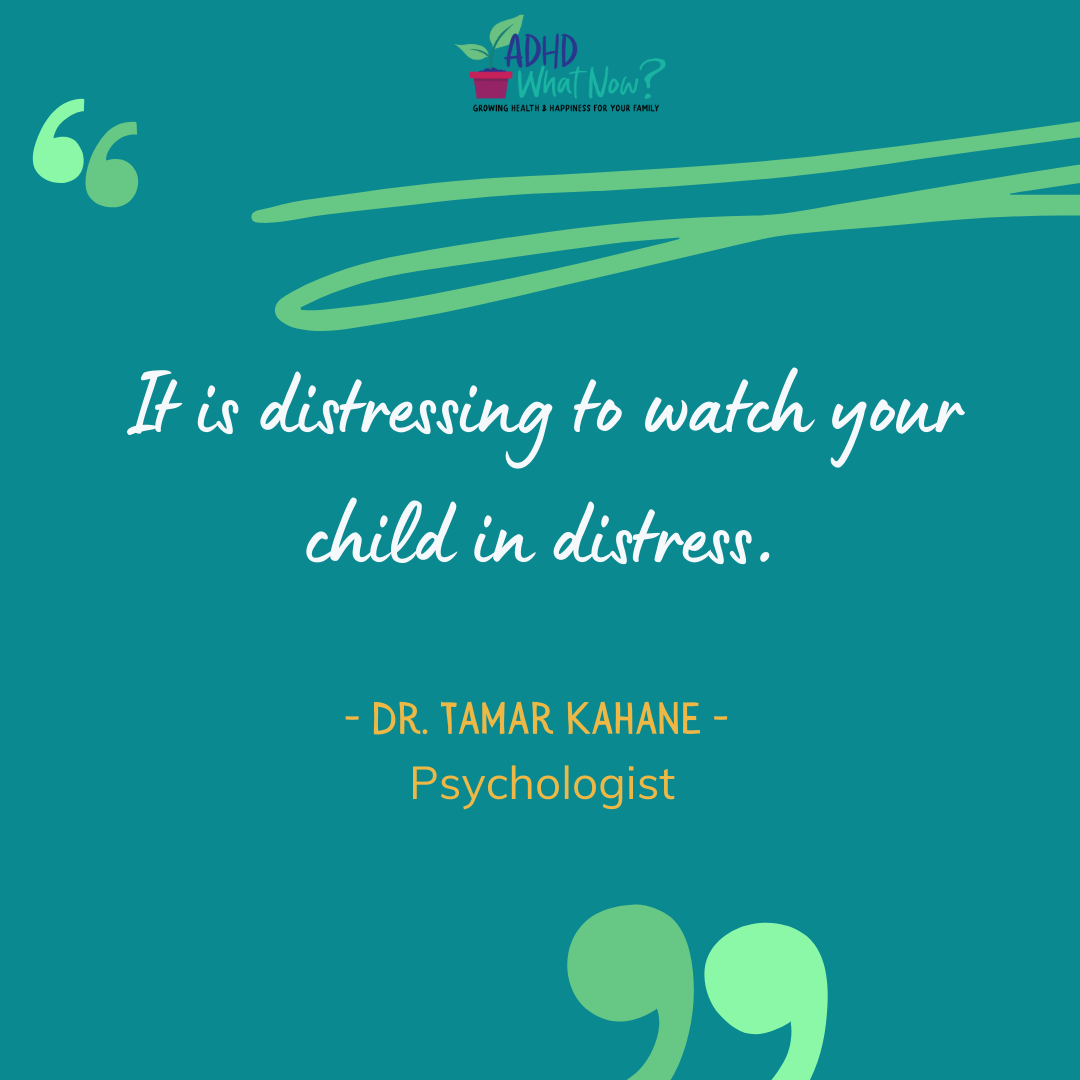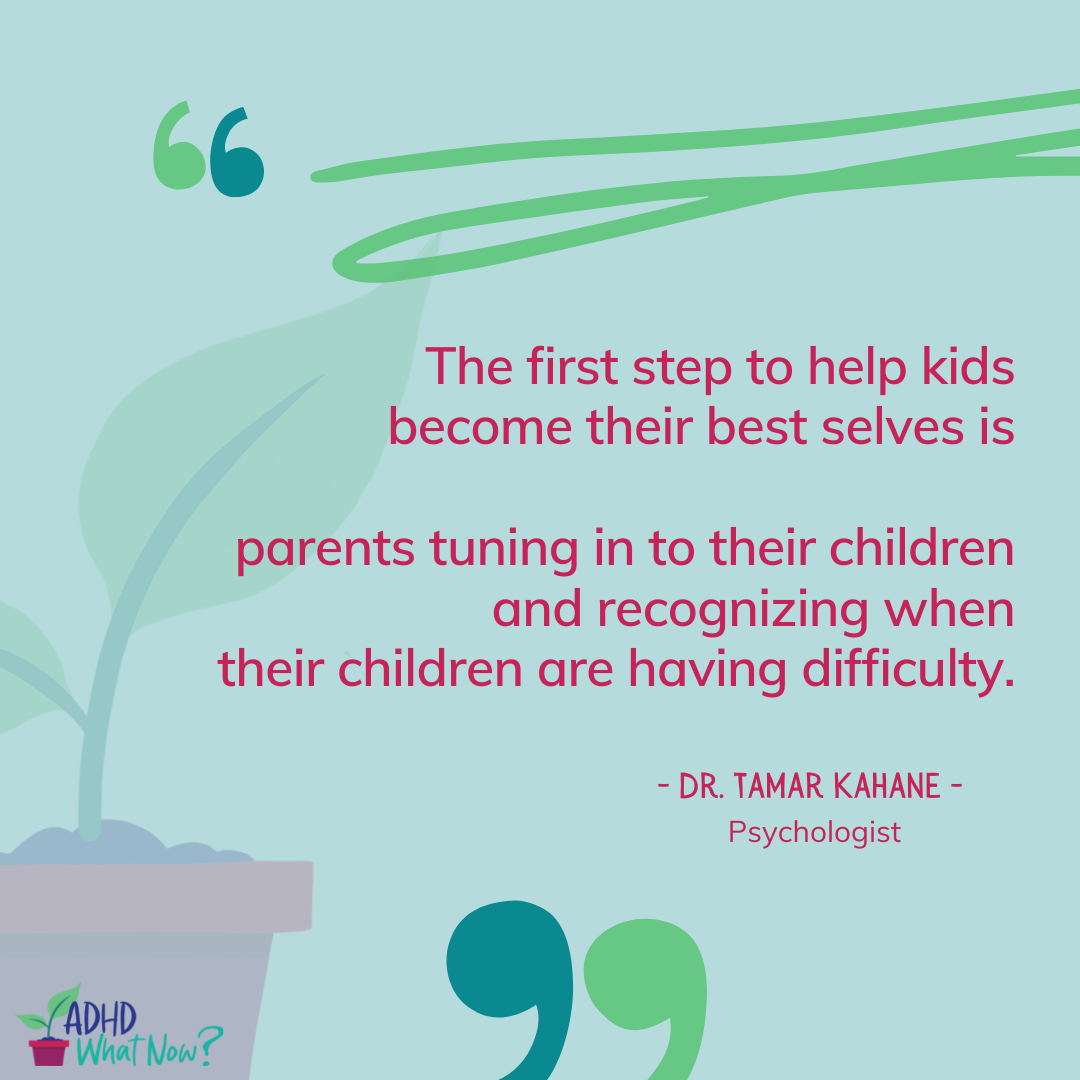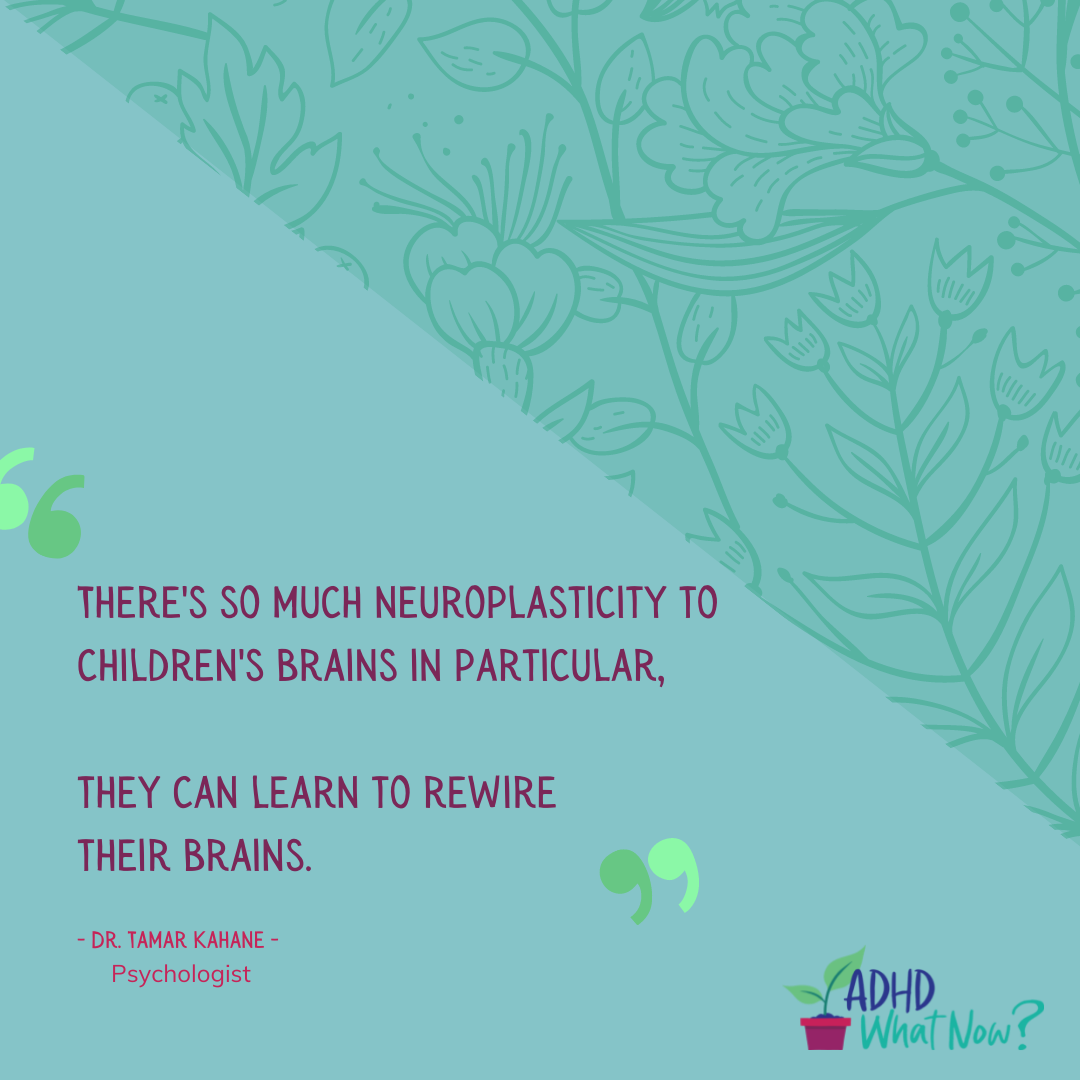How to Help Your Child Become Their Best Self
Jun 02, 2022So, you're trying to rush out the door to get to school on time, and the backpack isn't packed, the kitchen is a mess, and your kiddo is nowhere to be seen.
What do you do?
In this moment, how do you balance the goal of being on time and the idea that we want the kiddo to become their best self?
Dr. Kahane, founder of The Kahane Center and a psychologist who has helped thousands of kids over the past 25 years and has been interviewed by The Washington Post and The New York Times, shares:
- How to balance the short-term pressure of getting out of the door on time and long-term goals so you can help your child build skills.
- How to define success as a parent to be something you feel good about.
- Common mistakes that can keep you from helping your child become their best self.
I am so glad that Dr. Kahane shared with us a little about her POWER program that helps kids learn to develop their emotional regulation skills and executive functioning skills.
It is especially challenging to find coaching for elementary-age kids that teaches our children to be independent and learn to manage themselves.
The Kahane Center POWER coaches help kids in 2nd grade and on up.
(And parents of any age. 😉)
Links
SHAREABLE GRAPHICS






FULL TRANSCRIPT
Veronica: So when you have a struggling kiddo, how do you help them become their best selves? What skills can you help them to build? And what is the goal for them to just grow into the fullness of who they are created to be? So, my name is Veronica Hunter and I help parents put together a plan for what to do when their kiddo has ADHD so that their families can flourish.
And I'm delighted to have with us today, Dr. Kahane who is a psychologist and practices out of the New York city, New Jersey area. And I will let her introduce herself more fully in a moment, but let me just tell you how I met Dr. Kahane.
I met her when my child was seven years old and I had met several other psychologists beforehand, but working with her had been truly transformational. I went to her because my kiddo was in school playing with his shoe laces, not paying attention in class, coming home and having challenges, getting into stressful interactions at home too.
And then after having worked with her with both myself and my son, for some of the programs that she'll share about with us later too, our family was able to transform and I felt like I had this good vision of what is needed to help the kiddo become his best self. And I'm delighted that she is going to share that and unpack that for us together here today. So welcome Dr. Kahane.
Dr. Kahane: Hi Veronica. It's great to be here and thank you for inviting me to speak today.
I think you just shared actually one of the very first things that's important to help our kids become the best selves they can be, which is parents tuning in to their children and recognizing when their children are having difficulty, and recognizing that with that awareness and helping that child become aware, it can really help that child shift and learn to overcome whatever challenges they have.
And I think that moment, for you Veronica, that you described so beautifully in terms of watching your son fiddle with his shoe laces, and kind of not being able to tune into everything that he needed to be tuned into it at that moment, perhaps was you as a mommy being sensitive and aware to something that maybe he needed.
And so I think that's the first step. And actually I'm the founder and director of The Kahane Center, which is an integrated kind of mental health center in Inglewood, New Jersey. And I practice there as well as in New York city. And the first thing we do is we actually do a three-part consultation at the center, which is we start by just getting a full understanding and background from parents. Then we meet with the child once, and then we meet with the parents and give them kind of a sense of our impressions and recommendations in terms of how to help best help them.
Veronica: I think I was surprised at first. Not surprised, but I mean, I loved that process, but honestly I was a little bit surprised when it wasn't focused on my kiddo. Cause like I went there to talk mostly about my kid and then it was much more comprehensive than that was the big revelation that happened from interacting with you. Can you share what is possible for our children? If we're, in general, if there's other parents out there that are feeling like their kid is struggling, can you share like, what is the potential light at the end of the tunnel?
Dr. Kahane: Right. Well, we're going to get to the potential light. But I think the first thing that's really helpful to think about is kind of, there is a little bit of a tension between what works in the moment with your child and what works in the bigger picture for your child.
So, in the moment you need them to get ready for school, in the moment you need them to be, get their homework done, in that moment you need them to get dressed or whatever it is that they need to be doing in that moment that they may not be doing as well as you need them to be doing it in order to be able to take care of their basic responsibilities.
So as a parent, I think very often we end up kind of, with children especially who have ADHD or have attentional difficulties, we end up doing for them. Because in that moment, it's very hard as a parent to step out and to let their children kind of, or to help their children, develop the skills to do for themselves. It's much quicker to just do it for them.
And so there's that short-term goal of getting them to school, which I totally get, and I understand, you know, pulls us very much to kind of execute for them. And as we know, children who have ADD have executive functioning difficulty, it's really hard for them to execute, harder than for other children. And it's hard for them to plan, and it's harder for them to prioritize, and it's harder for them to organize the sequence of events and to see cause and effect. That's why they can be very impulsive. And to connect the dots and to learn from their mistakes.
And all those things are inordinately frustrating for a parent, understandably. And so our kind of go-to very often is to be their compensation, like to do it for them or to fix it for them sometimes. And so it's about - and in the long-term though, what do we want? We need them to learn... Veronica, what do we need them to learn to do?
Veronica: How to be successful on their own independently when they grow up.
Dr. Kahane: Like you said, to be their best selves, right? And if we want them to be their best selves, we need to use these opportunities as practice opportunities for them to develop these skills, to become fortified and overcome some of these challenges. Do they need more or less practice than other children in terms of these things?
Veronica: More practice.
Dr. Kahane: Exactly. But as a parent, understandably, it's so frustrating and so difficult that we feel bad for them. We authentically don't like to feel their distress. It's distressing to watch your child in distress or frustrated or having difficulty with something.
So there's that tension very often between what works in the moment and what works in the long run. And that's something that I very much feel is a very big piece of the key to unlocking helping children with ADD, is helping parents navigate that because it is a balance.
We can't always, right, and it's about how to learn skills and strategies to help your children in those moments, use those moments as practicing opportunities. Because there's so much neuro-plasticity to our brains, to little children's brains in particular, where they can learn how to rewire their brain.
And that's kind of a long-winded answer to what you asked me, which is, what do I see as the potential kind of long-term light at the end of the tunnel, which is thankfully after being in practice for 25 years or more, I can easily, readily, and confidently say to you that there's a beautiful light at the end of the tunnel with support and active teachings and help, for sure.
I have had many, many children at this point who started off really, really struggling in terms of their ability to attend and to follow through and to organize themselves and prioritize and pay attention in school and all the things that, and to be social, that's a whole 'nother piece of kind of ADD sometimes for children.
Veronica: I was just going to say, as you were talking about kind of that in that moment and the draw between short-term goals and like maybe long-term goals and practicing, I think one of the things that you and I had discussed in the past was defining success. And I think that, could you talk a little bit more about that because that just helps me feel a little bit better.
Dr. Kahane: Absolutely. Absolutely. And not just you Veronica, it helps you feel a little better. I think it helps parents feel a little better because parenting is the most difficult job you'll ever, ever have for sure. And I think very often parents kind of can be very hard on themselves and they mark their success with their child, not based on them practicing a skill, but based on their child's response. So if their child responds positively, oh, it works. And if their child responds negatively or doesn't do what they want them to do, or doesn't listen or doesn't learn right away, then it's a failure, it's not working and I'll try something else.
And so one of the things I really believe is deeply very important, and sounds like it resonated for you, Veronica, is the idea that if we can mark our success as parents, not based on how our children react to what we're doing, but on the fact that we practice that skill, then ultimately we will be successful with our child. We can really give ourselves credit when we practice the skill that we're learning to help our children who have ADD rather than acknowledge our success based on the fact that they were successful or responded the way they needed to, then ultimately, we will be successful. And I think that that's really important.
Veronica: So for example, if your goal is, or if you're in the moment trying to do something, but you want to help them practice that skill and you define success as I'm going to actually be able to pause and put aside that short-term objective and I'm going to choose to work on this long-term skill and let them practice that. And then that becomes your definition of success. Then that opens up the possibilities. Is that what you're saying?
Dr. Kahane: Exactly, exactly. Right. Because there will be times where it will be. I mean, obviously it's a cost benefit, and in that moment they may be even late to school, but if you got them to school and I know that doesn't, that's a hard, that's a tough pill to swallow and you may, as a parent, you may choose not to apply it in that kind of situation because the stakes are too high, maybe, which I totally get.
But you know, if you are looking to practice, for example, screaming less at your child, let's say right, and you don't scream at them and they still haven't listened to you, right? You were successful by definition of the fact that you didn't scream at them at that moment, even if they didn't do what you wanted them to do at that moment, that was a successful interaction, let's say. You can give me a different example. There are many, many, many examples we could use in that situation, but that's just.
Veronica: Yeah,thank you. What are some common things to steer clear of as a parent or some pitfalls that you see parents make or mistakes that perhaps we feel tempted to do?
Dr. Kahane: A lot of times parents start off very calm. Then they say the same thing over and over and over again. And there's a certain point their patience level goes all the way down and their tendency to become dysregulated themselves goes up, understandably, right? First time we can say it nicely and patiently. And if the child's not listening, not listening. So that's a very common, I would say, mistake that parents make is that they repeat the same thing too many times.
I deeply believe that parents need to establish credibility with their children. And in order to do that, we really need to be able to say things once, stick with it and line up our actions with those words. So that would be something that I would say.
The other thing I would say is a very, very significant pitfall that many, many parents inadvertently fall into is the idea that if I hear my child and I listened to what they want, then I have to give them what they want, or if I'm not going to give them what they want, then I can't acknowledge that they want it.
So let's say a child wants to stay up late, okay. And doesn't want to take their bath. So a parent will say, no, you have to take your bath. And then they will insist that they take their bath, or they will say, okay, fine, you don't need to take your bath tonight. But what if they were able to say, "I understand you don't want to take your bath tonight. It's hard to stop watching TV or playing on your iPad and going into your bath. And you need to take your bath in five minutes".
So it's, I can hear you, I can acknowledge you, I can help you feel understood and real and important. And, I as a mommy or daddy can set limits with you. That's a very important game changer in life because the likelihood, Veronica, of your child doing what you want them and need them to do at that moment goes way up. I can't promise it will be a hundred percent, but it will definitely rise in terms of likelihood of them cooperating and doing it.
Veronica: Because they feel heard. Like that's why, because they feel heard and understood?
Dr. Kahane: Yeah. And you're helping them transition. You know we talk a lot about transitions with ADD. Transition is not just about transitioning from one activity to another. It's about transitioning from one thought to the next in your brain. It's the transition of practice of preparing yourself emotionally for that shift. So you're really helping your children learn how to shift.
People with ADD are often kind of more rigid and have more difficulties with what's called shifting set. So that's helpful in that way as well. So yes, everything you said and that.
Veronica: It sounds like there's a lot of skills from what you just shared, right? There are so many different skills within the child, well and the parent, that you're working on at that point in time. Can you name a few of them?
Dr. Kahane: Well, you know, it's interesting you asked me that Veronica, can you name a few of them? Naming skills is hugely important because when we have a name for something and you intuitively got that, or maybe also you're a TKC trained mommy, but when you have a name for something, what happens?
Veronica: You can identify it and see it and call it out more.
Dr. Kahane: Yeah. You can retrieve it more readily. And that's super helpful to being able to acquire skills. And I'm a big believer in having a language for skills. And actually that's a good transition for me to talk to you a little bit about a curriculum that I wrote.
That's an SEL curriculum, social, emotional learning curriculum and executive functioning curriculum. It's both and it's called POWER. And the name stands for, it's an acronym. So the P is for, do you remember, do you know?
Veronica: Prioritize.
Dr. Kahane: That's right. Yeah. So the P is for prioritizing, it's red; and the O's for organizing, it's green; and the W is for work and it's blue; the E is for exercise and it's orange; and the R is for regulate, which is emotional regulation and it's purple. So each skillset has a different color. So it's color coded. And just the name itself is a tool within a tool, so to speak, right, because it's an acronym.
So it helps kids remember, but there are many, many, many skills within that curriculum that are each one of them is named. And it's about developing a language of these skills so that kids can begin to learn how to prioritize, how to organize themselves in terms of their things and their thoughts and their time and their space and their feelings. And it's about learning how to work, how to persevere, how to develop the skills they need to tolerate frustration, because that's part of learning how to work and how to use exercises and mechanisms to help them regulate their attention and emotion and how to get better at all those other skills as well. And regulate is about their emotional regulation, which without that, obviously there's no learning that can take place. So that's super important.
Veronica: So that program is available just to local people or you have, what does it look like and what ages can go through it?
Dr. Kahane: Right. So we've been running it in a number of schools, public schools in Brooklyn county, it's training teachers. We also train parents at the center. We do parent groups. It starts from age, all the way we've trained kids in schools, in the tri-state area, starting with four or five year olds all the way through high school.
Presently in terms of the coaching, we're doing at the center is mostly for school-aged kids, starting from second grade all the way through high school. But we also do parent training for children younger than that, in terms of training parents to become empowered parents or power parents so that they can help their kids learn these skills.
Veronica: And you have some information about that available on your website. Is that right?
Dr. Kahane: Yeah. We have some information available on the website, so absolutely yes.
Veronica: I know I looked and I saw, additionally, also courses for growth mindset and that those programs that you mentioned, you have people available that can work one-on-one with the kids? Has that been remote because of the pandemic that we're in?
Dr. Kahane: Yeah. We're hybrid at the center, but the power coaching has been mostly remote. Yeah.
Veronica: Okay, excellent. Thank you so much for taking the time to be here. Any other thoughts you'd like to share before we wrap up our conversation?
Dr. Kahane: I think moms and parents in general, don't give themselves enough credit for everything that they're doing. It's hard enough to be a parent when a child's developing without unique challenges, but I think it becomes much harder to figure it out and it's a process of figuring it out. And I think it's really important that, obviously if you're watching this, that already says something about you and about everybody who's interested in this group, because it says, I'm going to get better at figuring this out and learn how to support my child in the very best way. And I think that's awesome.
So I think giving yourself credit, that's a POWER skill, it's called pause and praise progress. And I would like to encourage everybody to do it. It takes the time to think about these things and develop awareness of helping their kids and recognizing that that's really what it's about. It's a process.
Veronica: Awesome. Thank you so much. You can find Dr. Kahane at TheKahaneCenter.com, right? And that's linked inside the description.